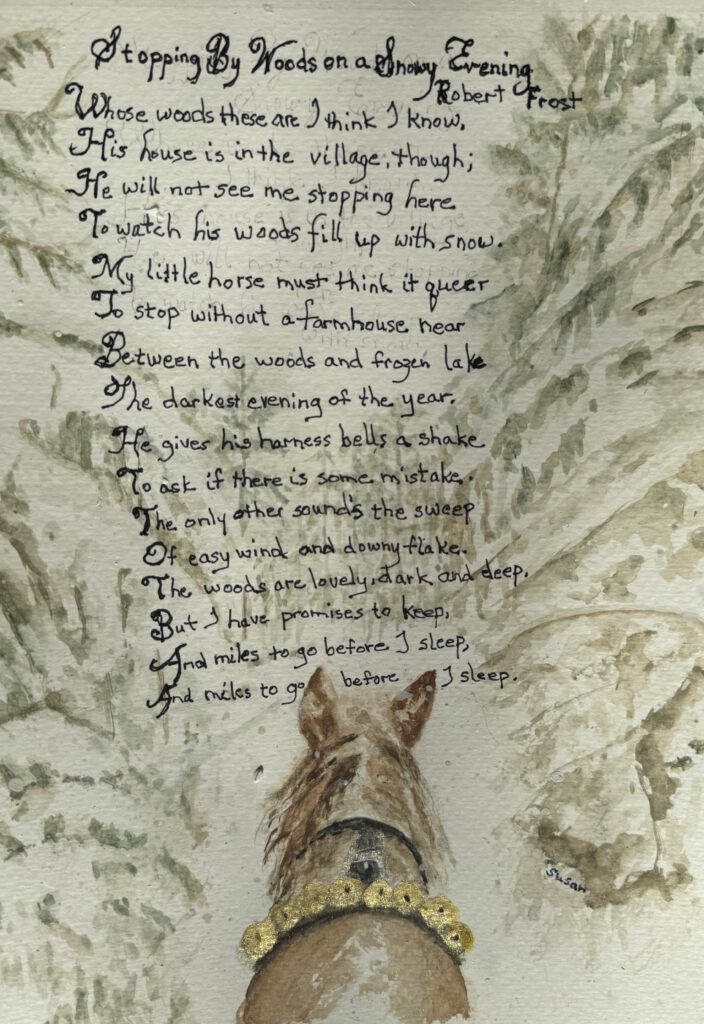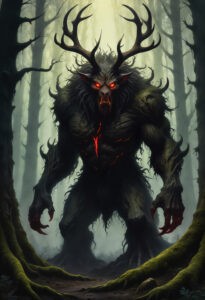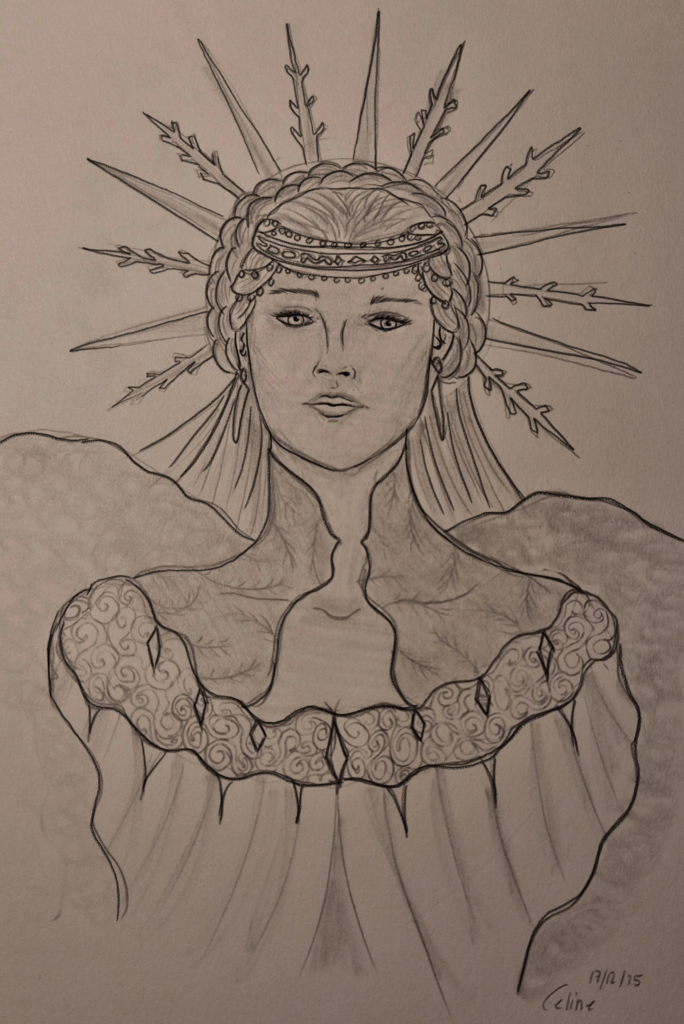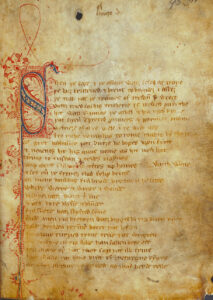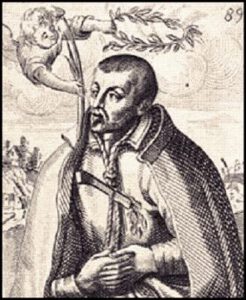Mythical Aspects of Poe's Detective
Lothar Černý
Published in Connotations Vol. 5.2-3 (1995/96)
Light, seeking light, doth light of light beguile;
So ere you find where light in darkness lies,
Your light grows dark by losing of your eyes.
(Love's Labour's Lost 1.1.77−79)
The detective as a literary figure has seen a process of emancipation from his origins in the nineteenth century and seems to exist beyond a specific work or author. Nineteenth−century authors like Poe or Wilkie Collins, and to some extent Dickens, have created the pattern for a virtually endless succession of detectives and related characters in literature and film. Considering also that the detective always implies a detective story with a distinctive plot—by its Greek name mythos1)—we might also think of Aristotle's use of the term mythos as relating events that have happened in the past. One could, therefore, venture the hypothesis that a modern myth has come into existence.2) If this is the case, the detective is the product of "deliberate fable−making"3) unlike ancient mythical characters who represent qualities, experiences, situations, or choices which are regarded as fundamental in human existence. Though they are, for all one knows, the result of an unconscious and possibly collective "mythopoeic imagination"4) there is no reason why a product of art like the detective should not also derive its substance and widespread appeal from such fundamental human experiences or qualities. In literature, furthermore, myths have become the source of many "stories" and may even turn into genres.5)
Assuming that the figure of the detective is at least implicitly regarded by modern readers and writers as a kind of myth, the answer to the question what makes him so is still an open one.6) I will risk two further hypotheses:
[→page 132] Firstly, Poe's detective achieves mythical status because he literally stands for truth, traditionally equated with the image of light and opposed to the darkness of ignorance. This tradition goes back (at least) to Plato's Parable of the Cave and to the neoplatonic interpretation of Plato.34) Secondly, the detective as well as the detective story appeals to readers because the seriousness of the ethical issues involved is held in suspension. It seems as if the activity of detection is primarily an aesthetic one and that the solution of the mystery, though a victory of truth, provides the same kind of satisfaction as the successful completion of a game. These two premises may seem to contradict each other, the one being rather rigorous, the other rather "playful." At the same time the dialectical concept of serio ludere immediately presents itself as a connecting link.
On the level of the plot—and therefore at the centre of the "myth"— the detective plays a particular role in the struggle between modern society and the forces of darkness and corruption that continually threaten it.7) He not only solves the riddle posed by a crime, he also protects or re−establishes order and justice, at times even against their own official representatives. The detective succeeds in restoring order in the "body politic," but his position remains that of an outsider. The extent of his power is limited to a particular case. He never becomes a "ruler" or a policeman. His position is always "ex−centric," at the margin of the social hierarchy, and he is without self−interest. Worldly power or material goods are not his objectives.
Even though he fulfils almost superhuman tasks like the heroes in numerous ancient myths, the detective achieves his real fame not through physical prowess (or any other traditional hero−quality), but above all by his ability to solve the riddle posed by an unexplained crime. His ultimate aim, then, is to serve the truth, to help truth come to light. Poe's Dupin provides the classic formula for this endeavour: "My ultimate object is only the truth" (2: 555). The pathos of this claim to find out the truth is the more obvious as Poe distinguishes this search from the verbal sophistry of the law. Commenting on his companion's advice "to make out his case" Dupin insists: "This may be the practice in law, but it is not the usage of reason" (2: 555).8) Considering these statements, one might go so far as to say that Poe creates a detective who follows [→page 133] in the footsteps of Plato's philosopher, his interest being in the truth and his ability to see the truth where others look in vain.
The Platonic metaphor of bringing truth to light identifies light and truth in the act of recognition. In Poe, however, a dialectical relationship between truth and light emerges, as Poe's detective explains the limited success and even failure of the Parisian police, notably of their head, Vidocq:
Vidocq … was a good guesser, and a persevering man. But, without educated thought, he erred continually by the very intensity of his investigations. He impaired his vision by holding the object too close… . Thus there is such a thing as being too profound. Truth is not always in a well. In fact, as regards the more important knowledge, I do believe that she is invariably superficial. The depth lies in the valleys where we seek her, and not upon mountain−tops where she is found. The modes and sources of this kind of error are well typified in the contemplation of the heavenly bodies. To look at a star by glances—to view it in a side−long way … is to behold the star distinctly—is to have the best appreciation of its lustre—a lustre which grows dim just in proportion as we turn our vision fully upon it. (2: 545)
This passage contains epistemological terms and problems familiar from Plato. In the Parable of the Cave in Book VII of The Republic light (the light of the sun) functions as the medium in which the world of ideas is perceived. It is metaphorically identified with truth. It participates in the ultimate idea of the good as the source of all that is true and beautiful. The world of ideas represents true reality; empirical reality by contrast is only a shadow. Its appearances represent the reality of the ideas only "darkly," in the form of shadowy images. As these are not essentially real, they are not true either. On the literal level of the parable, moving from the darkness of the cave into the world of light leads to the problem of being almost blinded by its brightness. To overcome this handicap to perception, Plato explains that one would gradually have to accustom one's eyes to the overwhelming experience of seeing.
The Platonic imagery of light and darkness is of central importance to Poe's text: the valleys and the depth of a well imply shadow and darkness like the cave while the mountain−tops, the "surfaces," are associated with light. However, unlike Plato, Poe does not choose the [→page 134] form of a parable but uses these images in a discursive context to exemplify his criticism of Vidocq's method and by implication to advocate Dupin's. On the one hand his criticism is directed towards the absence of any real method, on the other his argument is directed against the futility of Vidocq's efforts. To drive his point home Dupin resorts to images of overlooking or not seeing the truth. As often in Poe, the name provides a clue to the problem. Vidocq's name begins with the root syllable of videre, and continues with the root syllable of docere betraying its ironical character. Its bearer does not really teach how to see. Vidocq's sheer intensity of seeing even produces blindness to the object "in view."
The most common failure to see the truth, however, is the result of looking for it in the wrong place; it is not hidden but open to view—as visible as the mountain tops. This is the "philosophical" premise throughout Poe's detective stories. There is a second reason for not seeing the truth. It is not possible to look into the source of light directly. To support his view Dupin also resorts to science, i.e. optics and astronomy where he observes the same law.9)
The light of the stars "grows dim just in proportion as we turn our vision fully upon it" (2: 545). Light is propitious to vision only when looked at indirectly or sideways; "a side−long way" will allow us to see "distinctly." Of Vidocq's intensity of investigation he says: "He impaired his vision by holding the object too close" (2: 545). For an explanation of this error Dupin refers to the light of the stars. Significantly he does not speak of observation but of "the contemplation of the heavenly bodies" (2: 545). Contemplation leads to associations that go beyond physical perception and points, moreover, to a spiritual and intellectual understanding. What the observation of the physical phenomenon of the star exemplifies, however, is the fact that you cannot look into light itself, that the source of light is visible only indirectly, "in a side−long way." Under these conditions "there is the more refined capacity for comprehension." Comprehension is another word that brings the subtext of recognition to the surface. Inversely, the lustre of the star "grows dim just in proportion as we turn our vision fully upon it." Looking into the source of light directly may lead to total blindness or, to change the [→page 135] perspective, "it is possible to make even Venus herself vanish from the firmament" (2: 546).
The essence of Plato's parable of one who is blinded by coming out of darkness into light and the metaphysical sense given to this movement resurfaces here as a problem of optical perception. Dupin's "scientific" comparisons typify epistemological principles, or to put it differently, empirical evidence is used to explain the failure to recognise truth: "Thus there is such a thing as being too profound… . By undue profundity we perplex and enfeeble thought" (2: 545). The tenor of the whole passage is resonant of epistemological terms like "thought," "truth," "knowledge," "profundity," "comprehension." The detective assumes the scientific pose, but his search for truth is related to the old philosophical question of the truth. In that search it seems as if science may not be his only nor his most important tool, as the ironical reference to Dupin's use of his glasses would indicate. He only wears his glasses, at the beginning of "The Mystery of Marie Roget," to hide from the Prefect that he is sleeping while the latter prattles on. They even serve as a camouflage in "The Purloined Letter" where Dupin uses them to keep his examination of the details in the room of the Minister unnoticed. The tool of seeing is not used by Dupin to improve seeing in the literal, optical sense, on the contrary it is virtually irrelevant to the seeing with the mind. In terms of finding out the truth, Dupin does not rely too much on science. Taking into account that the narrator in "The Murders in the Rue Morgue" admires Dupin's "ideality" we are reminded of the derivation of Greek idea from the verb idein, to see, which makes it possible to understand Dupin as a "seer" and that his seeing is identical with recognising the truth of things.
It seems as if Poe is sceptical not only as to the method of the police, but that light as a metaphor of truth comes under attack. This is done, for instance, by naming newspapers according to the formula "lucus a non lucendo". The paper in which Dupin and his companion read about the murders in the Rue Morgue is called Gazette des Tribunaux (2: 537). Deriving "Gazette," by way of pseudo−etymology, from gaze seems adequate not only because of Poe's (or Dupin's) dislike of mere "gazing" but because of the actual lexical semantics and etymology of the word: To gaze derives from the Scandinavian, its ON meaning being [→page 136] goose, Icl. gander and in other Nordic dialects even fool and reckless person.10) The association with gossip is obvious. The gazing of this paper at the latest news leads to as little insight as the intensity of inquiry applied by the Prefect.
The Gazette des Tribunaux "gazes" at the events three times, in other words only repeats the gossip, and finally reports the arrest of the obviously innocent man, whom Poe aptly names Le Bon (2: 544). It is at this point that Dupin, who in spite of his name is not a "dupe," takes up his examinations: "We will go and see the premises with our own eyes" (2: 546). Dupin scrutinises everything and sees more than anyone else, of course. He sees "the peculiarity of the evidence" (2: 549). The truth is not in a well, but visible as on a mountain top. (This would imply that Dupin sees the truth in an instant, but allows the narrator and the reader to follow him in a step by step analysis.)
While some of the names Poe gave to the newspapers in his stories—Le Mercurie (3: 753), Le Diligence (3: 754), Le Moniteur (3: 740)—represent an ironical comment on their claim to reporting the truth, L'Etoile and Le Soleil invoke the connection between light and truth.11) For all their pretensions to sun−like or star−like shining, these papers are far from enlightened or enlightening. They are not sources of truth. Dupin speaks of "the dogmatic ignorance of Le Soleil" (3: 761). As newspapers go, their primary interest, as Dupin says about Le Commerciel (sic!), is "rather to create a sensation … than to further the cause of truth" (3: 738). Neither the light, nor the "gazing" of the papers nor the all too intense inquiries of the Prefect lead to the truth. The metaphor of light has lost its unequivocal reference to truth and the Platonic equation of light and dark seems virtually reversed. The paradoxes resulting from this make for a new structural pattern and require a dialectical kind of understanding.
Dupin prefers darkness to light even to the extent of creating an artificial darkness (2: 532). When this choice is explained, however, the reader is due for another surprise. Dupin does not prefer night for sheer opposition to the Prefect's benighted use of daylight but for an absolutely independent, apparently illogical reason. A follower of the "sable divinity," he is "enamored of the Night for her own sake" (2: 532), a fact which leaves the narrator as baffled as the Prefect (3: 975). The [→page 137] narrator goes so far as to admit that most people, had they known about the life he and Dupin were leading, would have regarded it as mad. In darkness Dupin's mind seems to be most awake and capable of giving its best to "reading, writing, or conversing." In "The Purloined Letter" this connection between intellectual activity and darkness is highlighted in a paradoxical statement:
"If it is any point requiring reflection," observed Dupin, as he forebore to enkindle the wick, "we shall examine it to better purpose in the dark." (3: 975)
Poe transposes the state of being metaphorically in the dark (about truth) into a real darkness, where only Dupin is able to "reflect" the light of truth in the double sense of the word. The truth shines in Dupin's darkness of night, be it real or artificial. Dupin's darkness, then, is radically different from the Prefect's. In his darkness Dupin sees the light of truth, while the Prefect even in the light of day remains in darkness. Since, however, such a kind of "being in the dark" in clear daylight is felt to be normal in the world of gazettes, he has every right to suspect Dupin of having "odd notions" (3: 975).
Once the reader follows Dupin into his enlightening darkness, he is in for more paradoxes, for looked at in the dark the problem which baffles the Prefect makes itself known as one whose very intricacy is its simplicity: "the mystery is a little too plain" or a "little too self−evident" (3: 975). For the Prefect who believes to have reason on his side, this must sound like total nonsense; he is blind for what is evident. For him, the truth of the matter does neither show nor shine. Therefore the Prefect's mind cannot "reflect" the truth. Dupin explains this phenomenon in "The Purloined Letter" by the game of puzzles, in which a word is written "upon the motley and perplexed surface of the chart" (3: 989) in such a way as to make it difficult to be discovered. Words in very large letters which should be most "evident" are, however, most commonly overlooked. In Dupin's view this observation represents an analogy to "the moral inapprehension by which the intellect suffers to pass unnoticed those considerations which are too obtrusively and too palpably self−evident" (3: 990). For Dupin the problem lies not in the particular nature of the truth but in the eye or rather the mind of the [→page 138] beholder. Therefore all the light of the stars would not suffice to make the Prefect recognise the truth, while not even darkness prevents Dupin from seeing it.
The imagery of light and darkness reverted takes us back to Plato12) but especially to Neoplatonism, and Christian Neoplatonism.13) Mystical speculation reached a first climax after the absorption of Neoplatonism into Christian theology in the writings of Dionysius the Areopagite.14) It continued in the negative theology of the Middle Ages and resurfaces in the mysticism of Renaissance Neoplatonism (including Jakob Boehme), in its philosophical as well as poetical branches. The Christian mystical notion of darkness as an image of God's incomprehensibility and total otherness, as in Dionysius or St John of the Cross are, of course, not the subject of Poe's tales. Dupin's asceticism, however, his life in the darkness of night, his love of silence (in contrast to the loquaciousness of the Prefect),15) his propensity to "moody reverie" (3: 724),35) to "abstraction" (3: 724), and also to "meditation" (3: 974), his ecstatic moments of analysis (2: 533)—but equally his poverty and detachment from material possessions which reflect the mystical renunciation of all things earthly16)—all this calls for regarding him, at least tentatively, as a secularised kind of mystic.17)
According to Dionysius "the superessential Darkness … is hidden by all the light that is in existing things."18) Therefore the mystic chooses night as a symbol of the renunciation of everything that stands between the soul and the creator. To St. John of the Cross, who continues the speculation of the Areopagite, night is the state in which the sensual part of the soul is at rest, leaving the mind free and unencumbered.19) Night represents the state of contemplation in which God provides the soul with the light of truth, but its incomparable brightness is experienced as darkness.20) In the same way believing, to John of the Cross, means intellectual darkness. God appears as dark night to the mind because it is incapable of grasping him.21)
The process of recognition which the mystics were intent to explore helps to understand the riddle of Dupin's method. The light in which the Prefect and the police try to find the truth is that of the material world: their approach is direct and therefore, seen in the perspective of Neoplatonic mysticism, necessarily ineffective. They are blind to the [→page 139] truth because they believe that you can look straight into it. Though it seems, at first, as if Poe eliminated the metaphysical sense of truth in the detective stories, the images of light and darkness or night provide a connotative link to the negative theology of the Neoplatonic tradition.
Apart from Plato and the Neoplatonic mystics the German Romantic philosophers Fichte and Schelling seem to have contributed to Poe's imagery of light and darkness.22) What makes Schelling relevant in this case is not so much the fact that he speaks of creation as "Ausstrahlungen," referring to Leibniz's "Fulgurationen," but that he links the image of the emanation of light to that of the night.36) It is out of a night sky that God's continuous flash of lightning emerges. Therefore, night and day in God are one. He is eternal night and eternal day. Fichte, in his later work, Wissenschaftslehre (1804), talks of God as "absolute light" following the light metaphor in the Gospel of St. John.23) Such a notion of God provides an additional reason why looking into the light blinds rather than enlightens.
A Romantic theorist whose work Poe knew well and who may, moreover, have served as an intermediary where Plato and the Neoplatonists are concerned, is Coleridge. In "The Destiny of Nations" (1796), Coleridge paraphrases Plato's Parable of the Cave ("Placed with our backs to bright Reality"), and identifies the light of the "eternal Sun" with the notion of God who "with retracted beams, and self−eclipse ⁄ Veiling" reveals himself.24) God, though absolute light, is hidden in darkness. Nature does not allow direct access to his unbearable brightness, but reflects him even in its lowliest forms. God reveals himself "Through meaner powers and secondary things ⁄ effulgent as through clouds that veil his blaze" (l. 15−6). Even though mankind cannot bear the full light, it needs the reflections of this light lest it should have to remain in total darkness. The motif of darkness conveys two meanings, here: darkness is the way in which the divine light becomes visible in the world of matter, and it expresses the separation from this light.
While Coleridge may be the most immediate source of such Neoplatonic images and thoughts, love poetry as well as religious poetry of the sixteenth and seventeenth centuries celebrate night in terms of mystical paradoxes. Dupin's love of night comes close to Neoplatonic mysticism which in varying ways and degrees permeates Shakespeare's [→page 140] as well as Metaphysical poetry. The first line of Shakespeare's Sonnet 43, "When most I winke then doe mine eyes best see," provides a formula for the activity of the imagination in sleep that is also characteristic of Dupin. There is also a structural relationship between Dupin's paradoxical love of night and the mystical celebration of night as we find it in Crashaw's Hymn on the Epiphany where the chorus concludes:
Now by abased liddes [we] shall learn to be
Eagles; and shutt our eyes that we may see. (232−33)25)
Reading on one feels tempted to regard Dupin's attitude to darkness as a secularised version of the prayer of Crashaw's poem:
By the frugall negatiue light
Of a most wise & well−abused Night
To read more legible thine originall Ray,
… . (210−12)26)
Obviously the mystical aspect of Dupin's love of night and his almost mystical ecstasy (when his analytic activity occupies his mind) do not as such constitute a mythical element of his character; they contribute, however, to mark his search for truth in opposition to the method of the police and the speculation of the public in general (represented by the newspapers); and they mark his social eccentricity, i. e. his aristocratic independence from social conventions.27)
Since, to a large extent, it is the negative way of the mystic which puts him in opposition to the institutionalised everyday world the mystical qualities also help shape the character of the great outsider as a myth, the more so as Poe adds simplicity to the detective's vision of truth. In a society of increasing complexity and incomprehensibility this makes the detective even more of an outsider. To Dupin truth is evident and truth is essentially simple, even playfully so. An element of pleasure pervades the whole process of finding the truth by means of analysis as practised by Dupin:
… I could not help remarking and admiring (although from his rich ideality I had been prepared to expect it) a peculiar analytic ability in Dupin. He [→page 141] seemed, too, to take an eager delight in its exercise—if not exactly in its display—and did not hesitate to confess the pleasure thus derived. (2: 533)
Four highly suggestive terms are linked here: "ideality" and "analytic ability" on the one hand, and "delight" and "pleasure" on the other. Rather than being oppositions they point to a dialectical unity. While the term "ideality" reminds us of the Platonic quality of Dupin's philosophy28) it is also synonymous with the imaginative faculty.29) And the pleasure Dupin derives from the exercise of the analytic faculty is said to be identical with the pleasure derived from the imagination.30)
It may be that the principle of pleasure involved in the exercise of analytical detection as an imaginative activity and the readers' participation in this exercise are the reasons for the continuous popularity of the detective story. The fictional detective appeals to our play instinct and we derive pleasure from watching the game. This is, perhaps, why we are not too shocked about the gruesome details Poe has introduced into the genre. Moral issues do not appear to be at stake in his stories. The purpose of playing is the game itself and the effect we derive from it is delight. Dupin is not interested in correcting the wrongs of widows and orphans, or in catching criminals, nor in fighting the forces of evil in the world. If all this really happens it is almost accidental.
"As for these murders, let us enter into some examinations for ourselves ... An inquiry will afford us amusement … ." (2: 546)
Here, instead of the word "pleasure" which Dupin uses to describe the exercise of his analytic ability, he uses the word "amusement," thus giving a hint that a more complex kind of pleasure principle seems to be involved. Nearly all meanings of to amuse31) seem to be present in Poe's usage, the two obsolete ones ("to muse intently, gaze in astonishment" and "to confound, distract, bewilder, puzzle") as well as the more familiar ones ("occupy the attention" and "to cause [time] to pass pleasantly"). However, the most interesting one is the traditional etymology of to muse derived from Latin musa,32) another reminder that an aesthetic motive is in the foreground of the detective's work. However, just as light as an image of truth has its dialectical complement [→page 142] in darkness, so the purely aesthetic motive of the detective is qualified by an ethical one, even though Dupin uses an understatement:
"… and, besides, Le Bon once rendered me a service for which I am not ungrateful … ." (2: 546)
Le Bon's very name serves as a reminder that ethical categories are a relevant element even in the pleasure provided by analytic detection. This game has a serious aspect to it—serio ludere indeed.
Dupin's endeavours to find the truth, then, appear in a field composed by the co−ordinates light and darkness, but pleasure and serious play constitute a third dimension which prevents the detective from becoming a mere representation of philosophical or theological ideas. He finds the truth on the surface rather than in hidden depths, not in the brightness of light, but in darkness; his way to the truth is not ponderous seriousness but rather in the nature of a game, and not a difficult one at that. This combination is quite different from the great examples of the history of philosophy and religious thinking, not to speak of the seriousness of science or the methodical procedures of the police. Dupin's way of finding the truth is idiosyncratic and perhaps it is his specific, indirect, playful and imaginative way that makes him a new mythical figure.
As far as Dupin is concerned Poe seems to be on a similar course as Dickens who, in Hard Times, opposes the world of the Gradgrinds with Sleary's Horse Riding, Cecilia's imaginative "world view," and the circus dogs who mysteriously find their way back home. Both writers seem to have created myths of the imagination, in which the search for truth goes "odd" ways.
Poe's detective looks for truth on the level of a game, but this does not mean that this search becomes trivial. The quest for truth in all its existential and philosophical dimensions which it has acquired in the history of Western philosophy is not eliminated or negated, but present in what I would call a state of suspension—not a suspension of disbelief, of course, but perhaps a suspension of belief. Dupin's claim that his "ultimate object is only the truth" recalls the idea of truth, even though the playful context prevents it from being filled with its strictly [→page 143] philosophical meaning. Even if the truth is nothing else but the correct analysis of how a murder was committed or how the letter was hidden etc. and that crime and punishment are virtually unimportant, the idea that truth comes to light or that justice prevails provides that horizon of ideality which Schiller thought the literature of the modern age should provide for its readers.33) He predicted that it would unite in the manner of playfulness the seemingly irreconcilable opposites, reality and ideality, the world of necessity and the world of freedom. The myth of the detective represents this new combination, rooted in the old but continuous quest for truth, and appealing at the same time to the equally deep−rooted sense of play and pleasure as a result of participating in the fictional endeavours of a detection.
Fachhochschule Köln
































 Ring out, wild bells, to the wild sky,
Ring out, wild bells, to the wild sky,







